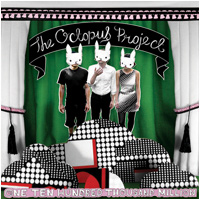
Joanna Newsom, a classically trained harpist, blends Appalachian folk with a more contemporary, as some would say "freak folk", sound.
Milk-Eyed Mender (2004, Drag City) is a multi-layered album, featuring powerfully articulate lyrics surrounded by simple, elegant arrangements. What really strikes me is the power of her voice. Originally Joanna planned on being a composer, and turned to singing relatively recently. Because of this, her voice has a rich timbre, which can be off-putting at first, but is something even the most sensitive listener can easily warm up to.
The third track on the album,
The Book of Right-On, is a great example of Joanna's ability to synchronize her lyrics with her instrumentation. The song opens up with a simple, yet rhythmically fascinating, bass-line. Once established, lyrics come into the song accompanied by a staccato, repetitive pedal chord. As the song continues, Joanna's lyrics take on a somewhat playful, but still complex, attitude, with the lines "I killed my dinner / with karate / kick 'em in the face / taste the body." As soon as this happens, Joanna moves back towards a more serious tone, with the following line "Shallow work / is the work that I do." The song's meaning is powerfully delivered towards the middle of the song, in a powerful example of rhyme, which really shows off Joanna's lyrical ability, "And even when you run through my mind / something else is in front, oh, you're behind / and I don't have to remind you to stay with your kind." The song is haunting, and gives the listener a lot to think about.
"En Gallop", the seventh track on the album, exemplifies Joanna's compositional skills. Although the song has lyrics, the focus is clearly on the melody and harmony, rather than the words themselves. It's not until the last section of lyrics that the listener understands the full weight and meaning of the song. "Never get so attached to a poem, you / Forget truth that lacks lyricism, and / Never get so close to the heat, that / You forget that you must eat, oh." After these lyrics ring out (the last "oh" sounds really reminiscent of Feist's
Mushaboom, to the point Fiest's song starts playing in my head every time I listen to this song), the song ends with a minute or so of solo harp playing, allowing the listener time to reflect on Joanna's words. The whole song has a crystalline texture, giving a sense of fragility and grace.
The whole album is wonderful, and includes some really powerful choruses, featuring a bunch of children, especially on the song
Peach, Plum, Pear. On a few songs, Joanna puts down her harp of a piano or, as on
Peach, Plum, Pear, a harpsichord. These songs bring a different sound to the album, which is still entirely Joanna. For anyone interested in lyrical poetry, classical music, or Appalachian folk, Joanna Newsom is a great discovery.




